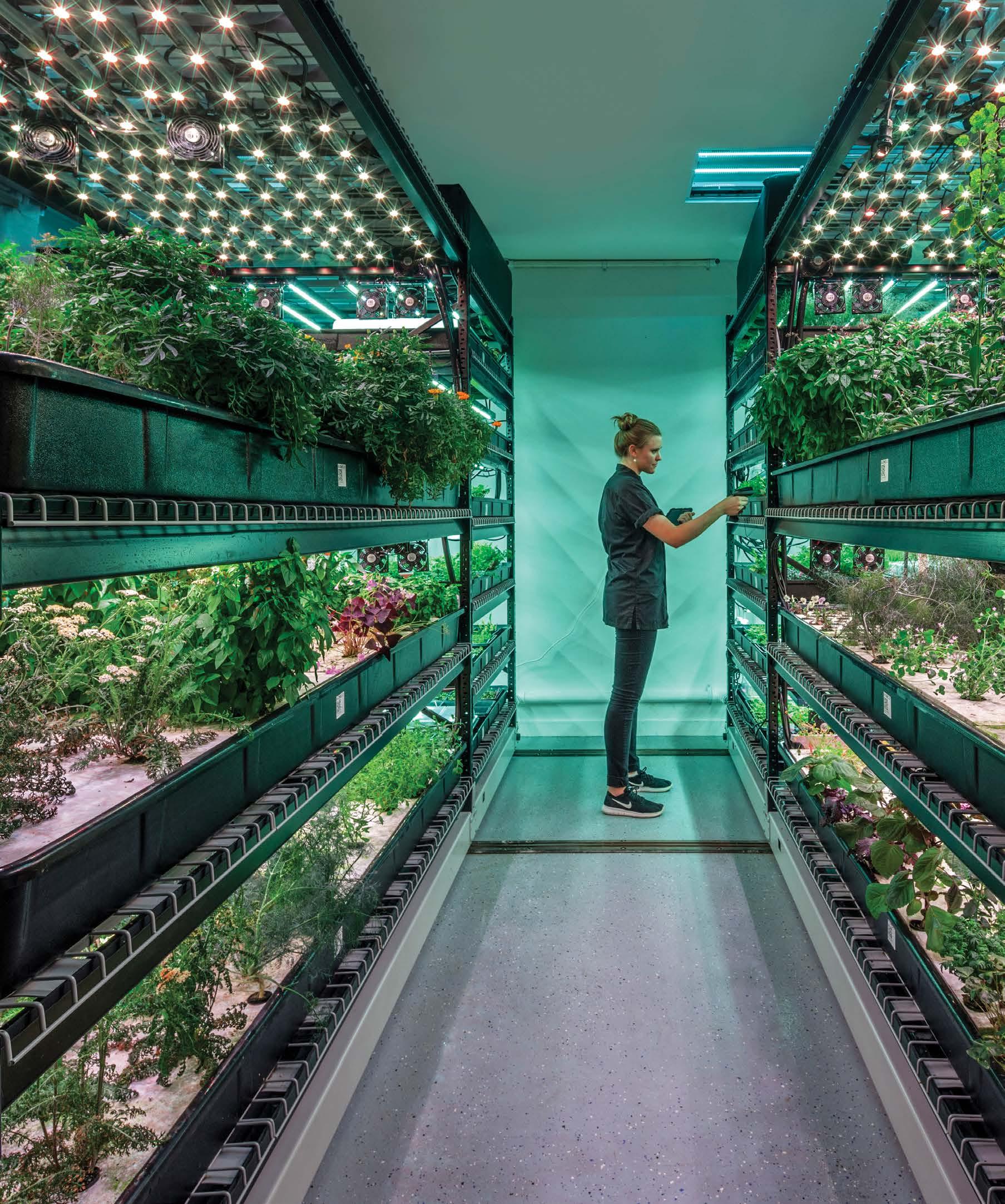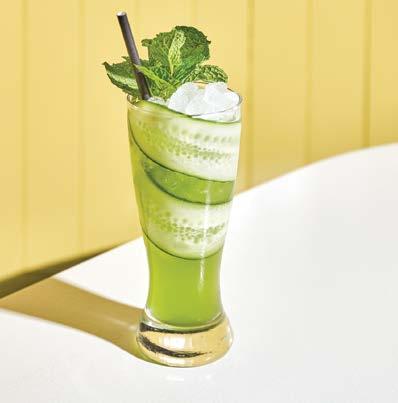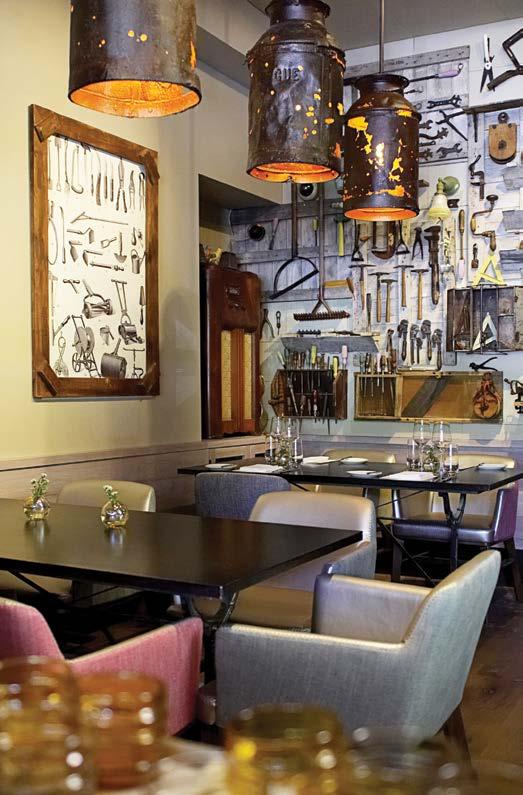
6 minute read
Savoir Fare: Farm Living
VERTICAL LIVING At FarmOne, underground space in TriBeCa is transformed into an urban farm.

Advertisement
FARM LIVING
New York City may be a concrete jungle, but behind the scenes there is a growing urban farm culture.
by Fernanda Mueller
IN THE CITY of skyscrapers, cabs and subways, where nature seems sparse, it can be a challenge to access fresh, healthy food. That is why a growing contingent of farms and restaurants are maximizing their local production to provide customers with better quality products. Whether they are part of the urban farm movement—giving new purpose to rooftops and unused spaces in the middle of the concrete jungle—or working with their own traditional farms upstate, these companies are pushing the food industry to become more sustainable, one lettuce leaf at a time.
FARM.ONE In New York City you can taste cuisines from all over the world, but it can be a challenge to find special produce, especially in the colder months. Farm.One is taking urban farming to the next—subterranean—level. Since their founding, they have grown over 700 varieties of microgreens, edible flowers, and rare herbs in a Tribeca basement, usually 50-150 varieties at a time. They work with top restaurant chefs in New York, including L’Atelier de Joel Robuchon, Marea, and their Michelin-rated neighbor Atera. In addition to their Tribeca basement location, they also have installations at The Dalton School, October, and Project Farmhouse, as well as an upcoming Hudson Yards Whole Foods location.
Farm.One creates a year-round controlled environment through a practice called Vertical Farming. Stacked multiple layers of growing trays are illuminated by LED lights to provide sunlight, and they all use hydroponic technology— growing plants in a water-based nutrient solution, instead of soil. They use a management software that guides the process from seed to harvest, using custom growing recipes for each species to optimize flavor and appearance.
If a chef wants to use Nepitella, an edible flower from Tuscany, Farm.One can grow it, delivering it within hours of harvest to ensure freshness. Founder and CEO Rob Laing is proud of the work they have done in the last three years. At the moment, they are focused on rare ingredients for elite restaurants because, as Laing explains, “Downtown’s gastronomy is very rich.” But he believes that vertical farming and hydroponic technology are the future, especially when it comes to sustainability. This kind of farming avoids pesticides, soil contamination, manure, and uses on average 95% less water than the equivalent conventional farm. Since it is possible to grow products in the middle of the city, they can be and often are delivered on foot or by subway, with almost zero emissions.
Farm.One offers tours which can be booked on their website. Guests can taste some of the special products while enjoying a glass of wine, or they can take a cocktail class hosted at the farm. That is a great way to create a local community of providers and consumers. farm.one



BLENHEIM You can have an authentic farm-to-table dining experience at this intimate Michelinrated restaurant in the West Village. Most of the dishes are made with the produce that they grow in their two upstate farms in the Catskills mountains—Blenheim Hill and Seven Ponds. Besides growing herbs, greens and vegetables, they raise chickens, horses, pigs, ducks, and Icelandic lamb.
During the summer, the vast majority of the restaurant’s menu comes from the farm, but for the rest of the year, the ingredients that they can’t grow are purchased from local providers. Executive chef Morten Sohlberg explains: “The most important thing for us is to make beautiful food, and we try to use as much as possible of what we can grow. We don’t intend to grow or raise things that just don’t make any sense for us.” The products are used not only in the restaurant, but also in the events hosted at the farms—weddings are a big part of their business. Chefs from Blenheim restaurant, Blenheim Hill Farm, and Seven Ponds Farm cook in each location, ensuring that the key recipes are exactly the same in all venues. In order to make sure that they don’t grow produce that won’t be used, Sohlberg interfaces between the upstate farms and the West Village restaurant, preventing food waste. He explains, “We have control over every stage of our operation, from how we are breeding the chicks and pigs all the way until it’s on the plate.” blenheimhill.com
DEVON
Eli Zabar created his network of markets, restaurants, and bars uptown. His son Oliver decided to expand the family legacy to Downtown, so along with his twin brother Sasha, he opened Devon—a restaurant that embodies the cool spirit of the Lower East Side.
What is really unique about the small neighborhood spot is that many ingredients used in the cocktails and dishes come straight from the family greenhouse, located on 91st street. Though the farm movement is big now, back in 1995, Eli Zabar built the first rooftop greenhouse atop his Vinegar Factory and over the years he has expanded the urban garden across two rooftops and 22.000 square feet. “We were definitely the first in New York, I don’t believe anyone was doing it back then. And even today, I can’t name any restaurant that has such a large amount of grow room area in the city,” says Sasha.
They use the hydroponic technology to grow many kinds of fruits, vegetables and herbs that are sold in the markets and used in the restaurants. Heirloom tomatoes are one of the Zabar’s Greenhouse highlights. The beautiful fruits are pollinated naturally, by birds, insects, wind, or human hands, which means there is no genetic modification. They use the entire harvest, from tomatoes sauces sold in the stores, to lemonade cocktails for Devon. Sasha explains: “We didn’t build the greenhouse for publicity, we did this because we wanted better quality ingredients.” devon-nyc.com

BROOKLYN GRANGE
With three rooftop farms in New York City—in Long Island City, Brooklyn Navy Yard and Sunset Park—Brooklyn Grange has been creating a sustainable model for urban agriculture since 2010. They have transformed bare roofs into ecosystems adhering to organic farming practices, and by doing so, they produce healthy food for the local community while helping the environment. “Once we have created an ecosystem on a roof, we have to maintain it and help it flourish. That means farming without chemicals, and with as much respect to conserving resources as possible.” The produce grown on the roofs is sold at the weekly farmer’s market at each location. You can also find their harvest in many restaurants and retailers in the city, which are listed on the Brooklyn Grange website. When planning what to grow for the season, they consider the community in which they are located. For example, since Sunset Park has the lowest single-occupancy rate in any neighborhood in New York—most households in the area are families—the bunch sizes that they create for sale at the market are planned accordingly.
Beyond the farm, Brooklyn Grange offers sustainability consulting services for companies all over the world. They plan, design, and install green roofs, green walls, and organic urban farm systems. Brooklyn Grange also supports youth educational visits to the farm through a program called City Growers, and they’ve already brought about 60,000 kids to the rooftops. “We need to teach the next generation, as well as our own, that the choices we make at the supermarket affect our ecosystem, and the environment in general. Our rooftop farms provide a really wonderful platform to do this, and can help support the rural farmers who truly feed our cities by growing a more informed and empowered urban consumer base.” brooklyngrangefarm.com DT










